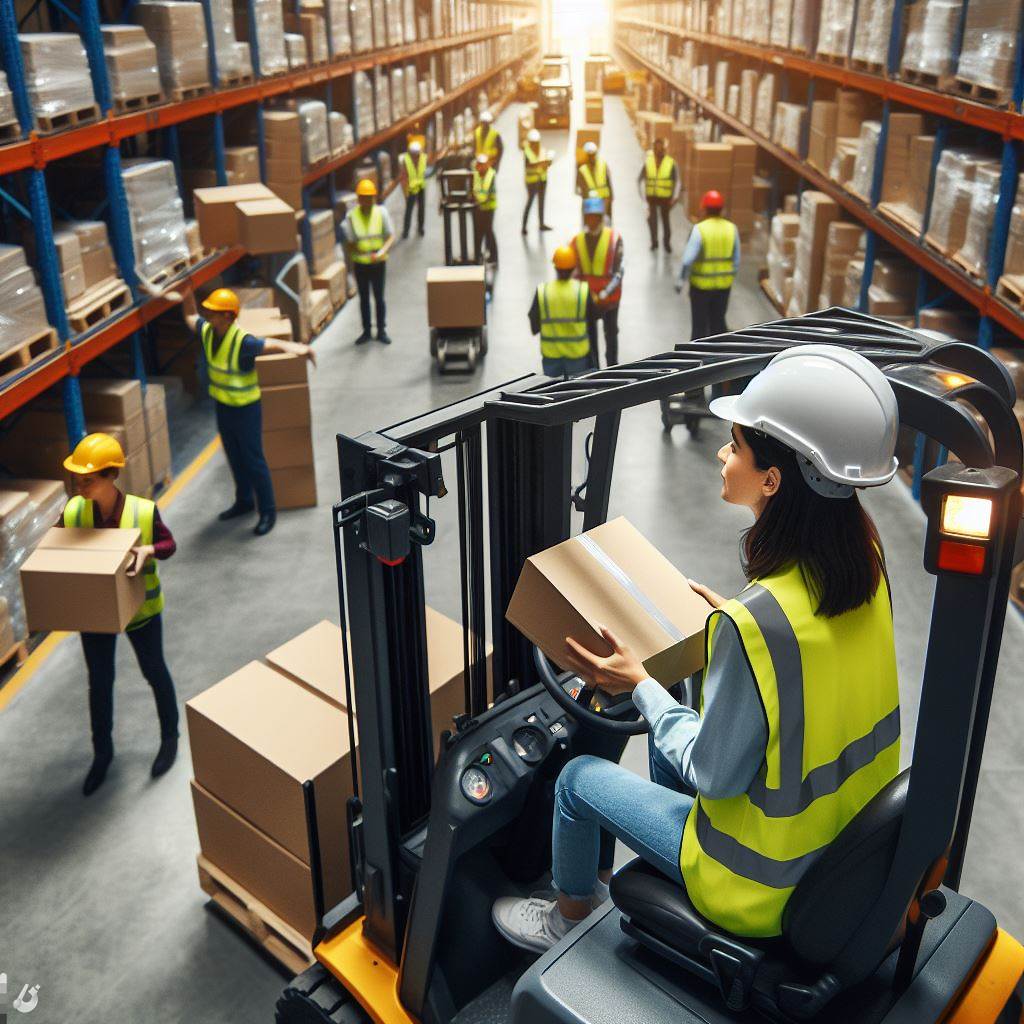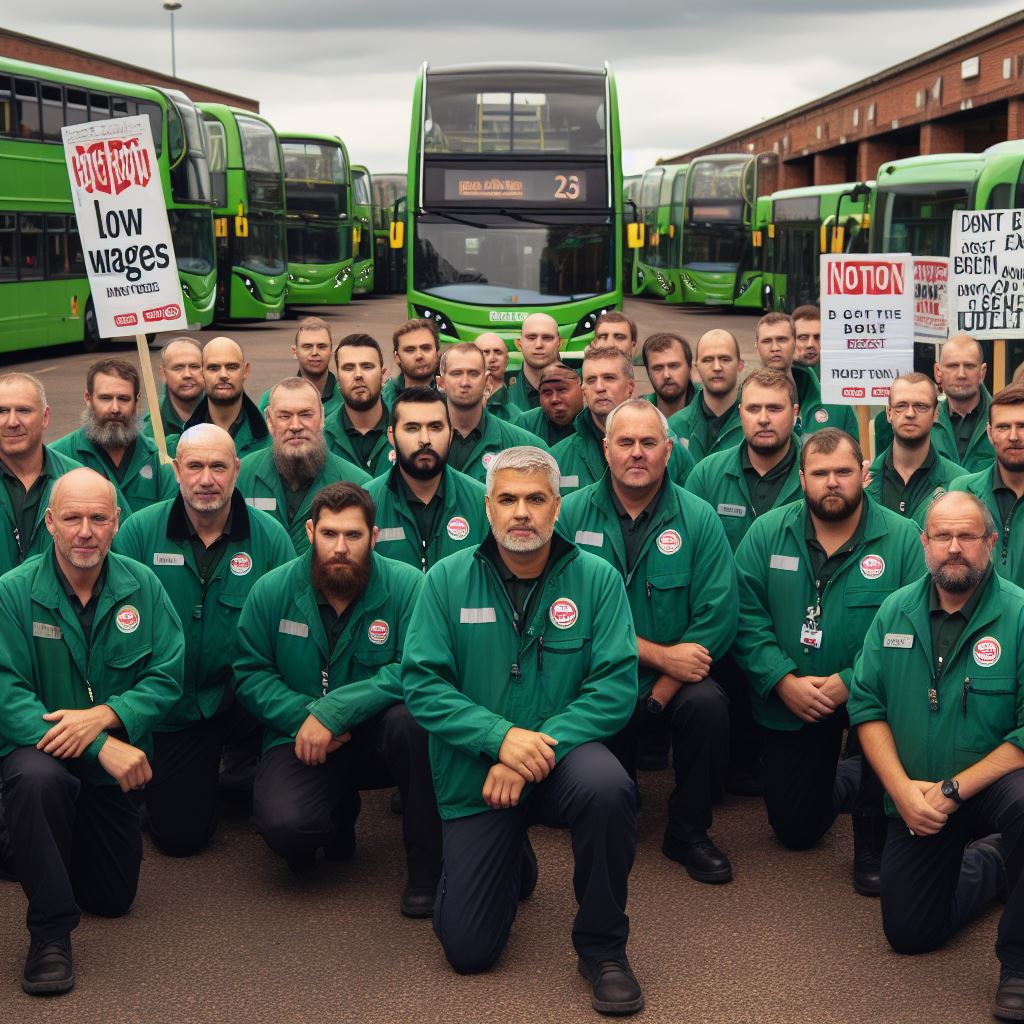Introduction
In the logistics industry, the role of women in the UK is a significant and relevant topic that deserves attention.
Discussing their contributions and challenges is crucial.
This blog post aims to shed light on their role and raise awareness about the importance of gender diversity in logistics.
To begin, it is important to understand the importance of women in the logistics industry in the UK.
Logistics plays a vital role in supply chains, ensuring the smooth flow of goods and services.
Women bring unique perspectives, skills, and insights that contribute to the industry’s success.
Recognizing their achievements and addressing any barriers they face is crucial for a truly inclusive and diverse sector.
This blog post will explore various aspects related to women in logistics in the UK, including their representation in the sector, challenges they face, and initiatives to promote gender equality.
Additionally, success stories of women who have made significant contributions to the industry will be highlighted.
By examining these topics, we can highlight the value of gender diversity in logistics and promote equality and opportunities for women in the industry.
The aim is to encourage discussions and actions that lead to a more inclusive and equal workplace.
In short, this blog post aims to emphasize the importance of discussing women in logistics in the UK.
By understanding their role and addressing the challenges they face, we can work towards creating a more inclusive and diverse industry.
Gender equality is not just a matter of fairness; it is essential for the success and innovation of the logistics sector.
Overview of the Logistics Industry in the UK
What the logistics industry entails and its significance in the UK
The logistics industry plays a significant role in the UK economy, facilitating the movement and storage of goods from one place to another.
Personalized UK Career Consulting
Receive tailored career guidance designed just for you. Get actionable steps and expert support to boost your career in 1-3 days. Take control of your career now.
Get StartedIt encompasses various sectors, including transportation, warehousing, and supply chain management.
The major sectors within the logistics industry
Transportation
- The transportation sector within the logistics industry involves the movement of goods by air, road, rail, and sea.
- UK has a well-developed transportation infrastructure that enables efficient movement of goods domestically and internationally.
- Major transportation players in the UK include freight forwarders, shipping lines, airlines, and trucking companies.
- Road transportation is particularly crucial, accounting for the majority of goods transported within the UK.
Warehousing
- Warehousing is another essential sector within the logistics industry, providing storage facilities for goods.
- There are various types of warehouses in the UK, including distribution centers, cold storage facilities, and fulfillment centers.
- Warehouses play a critical role in managing inventory and ensuring the timely delivery of goods.
- They are equipped with advanced technology and systems to optimize storage and retrieval processes.
Supply Chain Management
- Supply chain management involves the coordination and integration of various activities to ensure the smooth flow of goods.
- It encompasses sourcing, procurement, inventory management, logistics planning, and customer relationship management.
- In the UK, supply chain management is a dynamic field, constantly adapting to the evolving market demands and customer expectations.
- Efficient supply chain management is crucial for businesses to remain competitive and meet customer demands in a timely manner.
The logistics industry in the UK is essential for both domestic and international trade.
It supports various sectors, including manufacturing, retail, e-commerce, and pharmaceuticals.
Without a robust logistics industry, businesses would face challenges in delivering goods to their customers efficiently.
In recent years, there has been a growing focus on diversity and inclusion in the logistics industry, particularly regarding the representation of women.
Traditionally, the sector has been predominantly male dominated.
However, efforts are being made to attract and retain more women in logistics roles.
Several initiatives and organizations in the UK are working towards promoting gender diversity and empowering women in the logistics industry.
These include mentorship programs, women’s networking groups, and scholarships targeted at women pursuing careers in logistics.
Increasing the representation of women in the logistics industry not only brings diverse perspectives and skills but also helps address the industry’s labor shortage.
By tapping into a larger talent pool, the industry can benefit from a broader range of skills and experiences.
In fact, the logistics industry in the UK encompasses various sectors, including transportation, warehousing, and supply chain management.
It plays a crucial role in the economy and facilitates the smooth movement of goods.
Efforts are being made to promote diversity and inclusion, particularly by increasing the representation of women in the industry.
Your Dream Job Starts with a Perfect CV
Get a tailored CV and cover letter that captures your unique strengths and stands out in your industry. Let us help you make an unforgettable first impression.
Get StartedRead: Public vs Private Sector: Transport Jobs
Historical Perspective on Women in Logistics
Women’s participation in the field of logistics has been historically limited.
Throughout the years, this industry has been predominantly male dominated, with women facing numerous challenges and stereotypes.
However, there have been significant changes and advancements in recent times, allowing more women to break barriers and excel in the logistics sector.
Limited Participation of Women in Logistics Historically
- Women were largely excluded from logistics roles in the past due to traditional gender norms and biases.
- Logistics was often regarded as a physically demanding and male-oriented industry, further inhibiting female participation.
- Gender discrimination and a lack of equal opportunities prevented women from pursuing careers in logistics.
- Certain job roles within the field were considered unsuitable for women, reinforcing gender stereotypes.
Significant Changes and Advancements
- In recent years, there has been a notable shift towards gender equality and diversity in the logistics industry.
- More companies recognize the value of women in logistics and strive to create inclusive work environments.
- Efforts have been made to eliminate gender-based barriers through equal opportunity policies and initiatives.
- Increased representation of successful women in influential logistics positions has inspired others to pursue careers in the field.
- Education and training programs have emerged to equip women with the necessary skills and knowledge for logistics roles.
Gender-Related Challenges and Stereotypes
- Women still encounter gender-related challenges such as stereotypes and bias when entering and advancing in logistics careers.
- There is a perception that women are better suited for administrative or support roles rather than leadership positions within the industry.
- The idea that logistics requires physical strength continues to be a stereotype that may discourage women from considering it as a career path.
- Workplace culture and existing gender imbalances can contribute to a lack of confidence or discouragement for women in logistics.
- However, women continue to challenge these stereotypes and prove their abilities in various logistics roles.
In essence, the historical perspective on women in logistics highlights the limited participation, gender-related challenges, and stereotypes prevalent in the industry.
Nevertheless, significant changes and advancements have occurred, leading to increased opportunities and recognition for women.
With ongoing efforts to establish gender equality, the logistics sector is gradually becoming more inclusive and diverse.
Read: Career Path: From Bus to Train Operator
Current Status of Women in Logistics in the UK
Statistical data regarding the representation of women in the logistics sector
According to statistical data, women make up only a small percentage of the logistics sector in the UK.
In 2019, women accounted for only 22% of the total workforce in the logistics and transport industry.
This low representation of women in logistics is a cause for concern and highlights the need for gender diversity.
Progress Made in Terms of Gender Diversity and Inclusion
Despite the low representation, there has been some progress in terms of gender diversity and inclusion in the logistics industry.
Companies and organizations have started recognizing the importance of diversity and are actively working towards promoting equal opportunities for women.
Some companies have implemented initiatives and programs to attract and retain more women in logistics roles.
Optimize Your LinkedIn for Success
Boost your LinkedIn profile with a professional bio, keyword-rich headline, and strategic recommendations that attract recruiters. Stand out from the crowd and get noticed.
Optimize NowSpecific Roles or Positions Where Women Are More Commonly Found Within the Industry
While women are underrepresented in logistics as a whole, there are specific roles where they are more commonly found.
Women often occupy positions in administrative roles, such as operations coordinators or logistic support staff.
Additionally, women are more visible in customer service and procurement roles within the logistics sector.
However, there is still a lack of women in higher-level management positions, such as logistics managers or directors.
Challenges Faced by Women in the Logistics Industry
The logistics industry traditionally has been male dominated, which can pose challenges for women.
- Bias and stereotypes often limit the opportunities available to women and hinder their career progression.
- Lack of flexible working arrangements and inadequate support networks also affect women’s participation and advancement in the industry.
- Sexual harassment and workplace discrimination are additional challenges that women may face in logistics.
Steps to Improve Gender Diversity and Inclusion in the Industry
- Creating awareness and addressing unconscious bias through training and educational programs.
- Encouraging more women to pursue careers in logistics through targeted recruitment efforts and scholarships.
- Providing mentorship and support networks for women in the industry to navigate challenges and advance their careers.
- Implementing flexible working arrangements to accommodate women’s needs and promote work-life balance.
- Promoting women’s representation in leadership positions through affirmative action and diversity policies.
The current status of women in logistics in the UK reflects a need for greater gender diversity and inclusion.
While progress has been made, there is still a long way to go in terms of achieving equal representation and opportunities for women.
By addressing challenges, promoting awareness, and implementing supportive measures, the logistics industry can create a more inclusive and diverse workforce.
Read: Understanding UK Trucking Regulations

Obstacles faced by women in logistics
The barriers and challenges faced by women in pursuing careers in logistics
- Gender bias: Women often face discrimination and stereotyping, being perceived as less competent.
- Career progression: Limited access to senior roles and lack of mentorship opportunities hinder their advancement.
- Lack of representation: Few women in leadership positions leads to a lack of role models and support.
- Work-life balance: Balancing family responsibilities with demanding logistics careers poses challenges.
- Pay disparity: Women generally earn less than their male counterparts for the same job.
Examples of initiatives or organizations working to address these obstacles
Despite these obstacles, several initiatives and organizations are working to address these challenges:
- Women in Logistics UK: An organization dedicated to promoting gender diversity and empowering women in the industry.
- Mentorship programs: Initiatives that connect women with successful professionals who can provide guidance and support.
- Diversity and inclusion policies: Companies implementing policies to eliminate gender bias and discrimination.
- Flexible work arrangements: Offering options such as part-time work or remote work to support work-life balance.
- Networking events and conferences: Opportunities for women to connect, share experiences, and build professional relationships.
Efforts being made to change the perception of women’s capabilities in the logistics field
Efforts are being made to change the perception of women’s capabilities in the logistics field:
- Education and awareness campaigns: Promoting the potential of women in logistics through targeted campaigns.
- Training and development programs: Equipping women with the necessary skills and knowledge to excel in their careers.
- Promotion of female role models: Highlighting successful women in logistics to inspire and motivate others.
- Advocacy for equal opportunities: Pressuring companies and industry bodies to create fair and inclusive workplaces.
Addressing both systemic issues and individual biases
To overcome the obstacles, it is crucial to address both systemic issues and individual biases:
- Gender-neutral recruitment and promotion processes: Evaluating candidates solely based on merit and qualifications.
- Creating networking and support structures: Encouraging the formation of women-focused groups within the industry.
- Providing leadership training: Equipping women with the necessary skills and confidence to take on senior roles.
- Recognizing and rewarding achievements: Celebrating the successes of women in logistics to boost their visibility and inspire others.
In general, women in logistics face various obstacles such as gender bias, limited opportunities, and work-life balance challenges.
However, initiatives and organizations are working towards overcoming these barriers, promoting diversity, and empowering women.
Through awareness, education, and policy changes, the industry can create a more inclusive and equal environment for women to thrive.
Read: Understanding UK Train Safety Standards
Success Stories of Women in Logistics
Inspiring stories of women who have succeeded in the logistics industry
Jane Smith
Jane Smith started her career in logistics as a warehouse operator, and through hard work and determination, she climbed the corporate ladder to become the first female logistics manager in her company.
- She implemented innovative strategies to improve efficiency in the warehouse, resulting in cost savings of over 15%.
- Jane was recognized for her leadership skills and was awarded the Logistics Professional of the Year.
- Her success story inspires other women to break barriers and pursue a career in logistics.
Sarah Johnson
Sarah Johnson is a trailblazer in the logistics industry, known for her exceptional contributions in supply chain management.
- She successfully implemented a global distribution network strategy, improving delivery times by 30%.
- Sarah’s expertise in cross-functional collaboration led to a reduction in shipping costs by 20%.
- Her achievements have paved the way for more women to hold senior positions in logistics.
Emily Turner
Emily Turner’s story is an inspiring example of perseverance and dedication, proving that gender should never be a barrier to success in logistics.
- Emily started as a delivery driver and worked her way up to become the operations director of a major logistics company.
- Her ability to adapt to challenges and find innovative solutions earned her recognition in the industry.
- Emily’s story encourages women to be confident in their abilities and seize opportunities for growth.
Career Paths and Lessons Learned
Pursuing your Passion
These success stories highlight the importance of women pursuing their passion and finding fulfillment in the logistics industry.
- Identify what drives you and develop your expertise in that area.
- Be willing to take on new challenges and continuously learn and grow.
- Network with industry professionals to gain exposure and open doors to new opportunities.
Embracing Leadership Roles
Women in logistics can learn from these success stories that embracing leadership roles is key to making a significant impact.
- Focus on developing your leadership skills through training and mentorship programs.
- Be confident in your abilities and actively seek opportunities to lead projects.
- Lead by example and inspire others to reach their full potential.
Overcoming Gender Stereotypes
These success stories challenge traditional gender roles and stereotypes in the logistics industry.
- Don’t let societal expectations discourage you from pursuing a career in logistics.
- Showcase your skills and capabilities to break down barriers and gain recognition.
- Support and mentor other women in the industry to create a more inclusive and diverse workforce.
In a nutshell, the success stories of women in logistics inspire and empower others to overcome obstacles and thrive in the industry.
They demonstrate that gender should never limit one’s potential for success, and encourage women to pursue their passion, embrace leadership roles, and challenge stereotypes.
Through these stories, we can learn valuable lessons and strive for a more inclusive and diverse logistics industry.
Efforts towards promoting gender diversity in logistics
The initiatives taken by companies, organizations, and the government to enhance female participation in logistics
In recent years, there has been a growing recognition of the need to promote gender diversity in the logistics industry in the United Kingdom.
Companies, organizations, and the government have taken various initiatives to enhance female participation in this traditionally male-dominated field.
Firstly, many companies are implementing programs and policies to encourage women to pursue careers in logistics.
They are actively recruiting women, not just for administrative roles, but also for operational and managerial positions.
Some companies have set targets to increase the number of women in their workforce, and they are taking steps to create a more inclusive environment.
Additionally, organizations dedicated to supporting women in logistics have been established.
These organizations provide training programs, mentorship opportunities, and networking events specifically aimed at empowering and equipping women for success in the industry.
Women can benefit from the knowledge and experience of senior professionals through mentorship programs, enabling them to navigate the challenges they may face.
The government has also played a role in promoting gender diversity in logistics.
It has launched various initiatives such as funding schemes and scholarships to encourage women to pursue education and careers in logistics.
Additionally, the government has collaborated with industry stakeholders to develop guidelines and best practices for promoting gender diversity in the workplace.
Training programs, mentorship opportunities, and networking events aimed at supporting women in the industry
Training programs
In this context, training programs have been instrumental in equipping women with the necessary skills and knowledge to excel in logistics.
These programs provide women with a solid foundation in logistics operations, supply chain management, and other relevant areas.
By acquiring these skills, women can contribute effectively and be recognized for their expertise.
Mentorship opportunities
Mentorship opportunities are another crucial aspect of enhancing female participation in logistics.
Women are paired with experienced professionals who can guide them through their career journey, providing advice, support, and advocacy.
This mentorship not only enhances the professional development of women but also helps them to overcome any obstacles they may encounter along the way.
Networking events
Networking events specifically focused on women in logistics have proven to be valuable platforms for connecting with like-minded professionals.
These events provide opportunities to exchange ideas, share experiences, and build relationships.
By participating in such events, women can expand their professional networks, gain insights into industry trends, and find potential career opportunities.
The benefits of diverse and inclusive workplaces in logistics
Promoting gender diversity in logistics is not just about fairness and equality; it also brings numerous benefits to workplaces.
Diverse teams are known to be more creative, innovative, and adaptable, leading to improved problem-solving and decision-making.
By having a mix of perspectives and experiences, companies can better understand and meet the diverse needs of their customers.
Furthermore, inclusive workplaces foster a positive company culture that attracts and retains talented individuals.
When women feel valued, supported, and respected, they are more likely to stay with the company long-term, reducing turnover rates.
This stability leads to better productivity and higher employee satisfaction, ultimately benefiting the entire organization.
In summary, efforts towards promoting gender diversity in logistics in the UK have gained momentum in recent years.
Companies, organizations, and the government have taken proactive steps to enhance female participation in the industry.
Through programs, mentorship opportunities, and networking events, women are being empowered and supported to succeed in logistics.
By embracing diversity and fostering inclusive workplaces, the logistics industry can harness the full potential of its workforce and drive innovation and success.
Conclusion
This blog post has discussed various aspects of women in logistics in the UK.
We have highlighted the underrepresentation of women in this industry and the need for increased gender diversity.
Throughout the post, we have explored the challenges faced by women in logistics, such as stereotyping and limited career opportunities.
We have also examined the importance of empowering women and promoting inclusivity in this field.
It is clear that continued efforts are required to break down barriers and provide equal opportunities for women in logistics.
Increased gender diversity not only fosters innovation and creativity but also enhances productivity and profitability within organizations.
Therefore, it is crucial for individuals and companies to support and encourage women pursuing careers in logistics.
This can be done through mentorship programs, networking opportunities, and advocacy for gender equality.
By working together, we can create a more inclusive and diverse industry.
Let us all commit to championing the cause of women in logistics and actively work towards a future where gender diversity is the norm, and women are empowered to excel in their careers.
[E-Book for Sale]
500 Cutting-Edge Tech Startup Ideas for 2024 & 2025: Innovate, Create, Dominate
$19.99 • 500 Tech Startup Ideas • 62 pages
You will get inspired with 500 innovative tech startup ideas for 2024 and 2025, complete with concise descriptions to help you kickstart your entrepreneurial journey in AI, Blockchain, IoT, Fintech, and AR/VR.




